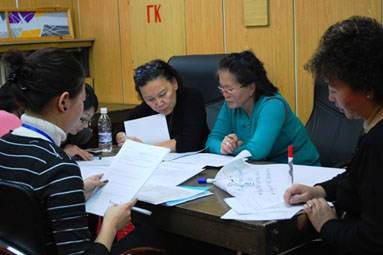A two-day training workshop on aid effectiveness for CSOs in Mongolia culminated in the creation of task teams to conduct a CSO monitoring of the PD and AAA implementation at the country level and prepare for dialogues with donors and governments to assert CSO participation in aid monitoring and evaluation and in the official PD survey process.
Eighteen organizations gathered together from 16-17 November 2010 in Ulaanbaatar, through the efforts of the Country Core Group (CCG), a coalition of CSOs working on various issues, including aid effectiveness, with the support of the Reality of Aid Network (RoA).
According to Urantsooj Gombosuren, Executive Director of the Centre for Human Rights and Democracy (CHRD) and CCG member, Mongolian CSOs are committed to do advocacy work on aid effectiveness, in particular, monitoring foreign-funded projects given the growing concern on the negative impact of aid in Mongolia. According to her, as of November 2010, foreign debt is already USD 1.6 B, which is almost equal to the total government annual budget. With a small population of 2,7 million, each person is calculated to have a debt of USD 592.
Despite the increasing amount of aid into the country, poverty levels remained as that of 1995-1996 levels with 36% of the population living below the poverty line.
The training workshop aimed to raise the awareness of CSOs on aid effectiveness, in particular the commitments made under the PD and AAA and identify the challenges and opportunities for CSO engagement.
As part of the workshop, CSOs presented the monitoring they conducted on three ADB-funded projects which yielded the same results: most of the money went into construction and procurement, there was no CSO participation in any of the stages and the projects failed and resulted to deeper debt. According to the speakers, 13 waste water processing facilities, which are part of one of the projects, freeze during winter and the surrounding communities end up cleaning after the leaks.
The participants discussed the monitoring matrix on PD and AAA implementation developed by RoA and identified challenges faced in conducting the survey and gathering data. CCG started sending out official letters to donors and government ministries requesting for information and most of the responses received, if none at all, directed them to the website, asked for personal appearance to get the data or said that their unit does not implement projects. Some donors were hesitant to provide information, saying that they only work with the government. On the little information that they gathered, there wasn’t much accessible information on loans. In total, they were able to dug out 23 projects financed through loans, with the majority coming from the minerals and energy sector. And of the 26 donors approached, only four responded so far. CSO participation was minimal and limited in the PME stages, and only when the implementing agencies lack human resources.
The CSO participants hope to gather all necessary data in time for the dialogues with governments and donors which will be opportunities not only to validate or verify data for the PD survey but also to campaign for the institutionalization of CSO participation in aid monitoring through setting up a legitimate space for CSOs in the country system on aid decisions and raising aid issues in CSOs agendas of discussions including emerging government-CSO mechanisms such as the citizens’ councils.

